On 5th April it will be precisely 20 years since Kurt Cobain died.
Aside from making me feel like I’m awake a few years passed my bedtime, it also prompts me to look back at that sensitive point in time, remembering what it was like, while also looking at how that moment has resonated across the two decades that have unbelievably now elapsed.
This is a fan-centric post by someone who’s never quite gotten over that body being found in that bleak garage in April 1994. In looking back at that moment, that year, and the twenty year aftermath, I will also be getting into some of the conspiracy theories or Cobain Murder Theories too – but, really, this isn’t an article about theories, but about the impact of that day in April 94 and its reverberations.
I really do remember Cobain’s passing as if it were yesterday. I was about thirteen when he died and I’d only been listening to Nirvana for about six months (I’d only heard Nevermind and In Utero at that point, not Bleach yet).
But Cobain’s music – and it has to be said, his death – had a profound effect on me, both at the time and for many years after.
It’s nothing new, in fact, to suggest his death had a profound effect on that generation (or two) – and was a defining moment.
As a relatively young person at the time, the manner of his death made me think about life and death, the nature of suicide, the transience and fragility of both hero figures and of existence itself, and and the strange notion of being lionized almost against your will, as Cobain claimed to be.
The irony being that by choosing the manner of death he did, he only ensured his permanent lionisation for all time.
What is certainly true for me (and I suspect true for a number of fans) is that in all of the twenty years since Kurt Cobain died, it has felt like a part of my consciousness or psychology has remained tied to that moment or has remained lingering in the sad or bleak images of that lonely-looking garage or greenhouse where Cobain’s life ended.
I had no idea at the time if people would still be talking about Cobain or Nirvana decades into the future; but at the time I remember his death felt like a watershed moment, felt like the biggest cultural moment of a generation.
With hindsight it definitely was; as well as being a formative influence in my life. I remember very specifically what I was doing when I heard about it; it was April 8th at that point and I was on my bed, reading an X-Men comic and I had the radio on when a news report broke on BBC Radio 1 that “a body had been found in the house of Nirvana singer, Kurt Cobain“.

Although his actual death wasn’t confirmed until later that day, I knew there and then what the story was going to be; and I remember distinctly that I kept getting images from the Heart Shaped Box video in my mind all that day, particularly the old figure on the cross and the image of Kurt laying in the flowers.
To this day, I feel really uncomfortable thinking about his death.
There have been other musicians I’ve loved who’ve died too since then – Layne Staley, Amy Winehouse, Shannon Hoon – and they all upset me; but it’s the way Kurt died. It’s the images of that bleak house and that garage, images that bury themselves in the memory, along with the strange words and sentiments of that suicide note, and the images of him for months beforehand posing with guns as if taunting us with a harrowing end-act that he was already picturing.
That’s one reason why I stopped watching that Last Days movie about an hour in and never tried to re-watch it; it’s just too authentic-feeling, so much so that I found it upsetting and disorienting.
“Kurt died in a very harsh way. It was so aggressive, and he wasn’t an aggressive person, he was a smart person, he had an interesting intellect. So it kind of made sense because it was like: wow, what a fucking gesture. But at the same time it was like: something’s wrong with that gesture.”
– Thurston Moore, Sonic Youth.
I vividly remember the coverage of his passing too; Cobain was on the cover of every music or cultural magazine for virtually the next month.
I remember being haunted specifically by the moody images of him on the covers of Kerrang! and the NME that week. And a Q magazine cover story with the questionable title of‘Why Cobain Had To Die’.
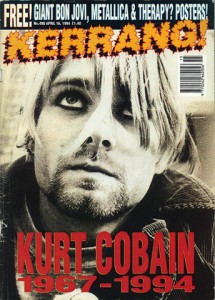
And I also recall how muted the mainstream, non-musical media’s coverage was in the UK; TV news items didn’t mention it at all and in the national papers, the story only appeared seven or eight pages in and in some cases was covered as though it was the passing of some minor rock junkie, as though Cobain was some mere Sid Vicious type figure; this was almost in keeping with the condescending tone in which some of the press had already been dealing with Kurt and Courtney prior to April 1994.
What clearly happened was that large portions of the mainstream media didn’t even realise that week how significant a story it was and how significant a figure Cobain was musically and culturally, which is extraordinary, especially when compared to this modern celebrity age where all kinds of non-stories about even the lowest-brow famous people make the news.
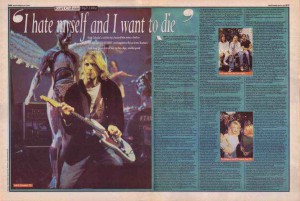
In the US, some older, more conservative voices clearly didn’t get the big deal or understand the grief from fans and were among those who had nothing good to say about Cobain, Nirvana, or the alternative scene in general; but then Reagan-auts and Thatcher-ites complaining about the “self-pity” and “weakness” of younger generations or “the slacker generation”, along with right-wing tirades about how “another Vietnam” would sort out these pathetic youngsters, was nothing new.
I remember also reading about and seeing pictures of the public vigil Nirvana fans had held in Seattle, attended by a grieving Courtney Love, who read from Kurt’s suicide note and handed out items of his clothing to fans.
I remember, in fact, looking at transcripts of his suicide letter in magazines and finding it baffling and inconsistent, particularly strange for the fact that he addressed portions of it to his fans, which seemed like a very non-Cobain sort of thing to do, with references to stardom and to other rock stars like Freddie Mercury.
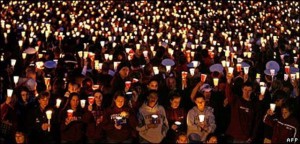
What was strange about that letter, in fact, was how much of it seemed to be focused on his feelings about music, the band, the fans, and stardom.
Kurt’s fitting reference to Neil Young’s “better to burn out than fade away” lyric aside, I also had always found it strange that his suicide note appeared in publications at all and always wondered if this was a violation of something that should’ve had a very limited audience (for want of a better term); however, then I remind myself that Kurt actually addressed much of it specifically to his fans.
At the funeral, Krist Novoselic made the most poignant comment, that Kurt’s “heart was his transmitter”.
I remember reading much later something that made me sad too; that Nirvana’s original drummer Chad Channing had driven down to attend the funeral but had sat at the back, not knowing anyone and not being spoken to.
Meanwhile, the news of Cobain’s body being found seemed to have deeply traumatised everyone involved in the alternative music scene. Kat Bjieland from Babes in Toyland talked about breaking down in tears when hearing the news. Chris Cornell later recalled that he and Soundgarden had been on tour, preparing for a show (Superunknown had just been released and become the fourth consecutive Seattle-scene release to open at No.1 in the album charts after Nirvana’s In Utero, Pearl Jam’s Vs and Alice in Chains’ Jar of Flies): Cornell, in an interview, recalls that Tad Doyle had burst into his dressing room and told him the news.
I remember reading the famous Melody Maker interview with Eddie Vedder the week of Cobain’s death, which exposed Vedder’s reaction to the passing of his ‘rival’ (as far as the press was concerned; though clearly Vedder never saw Cobain as a rival at all, but as a contemporary); Eddie seemed like he was losing the plot.

On the night of April 8th, while news of Cobain’s death had only been public for a few hours, Pearl Jam were on stage in Fairfax, Virginia, with Vedder telling the crowd, “I don’t think any of us would be here tonight in this place without Kurt Cobain”.
Meanwhile ‘Pennyroyal Tea’ became the Nirvana single that never was.
Although the third single from In Utero had already been printed, its intended release on May 6th was cancelled because it was considered distasteful, even though it would’ve almost certainly sold massively.
Although Nirvana CDs sold massively in the weeks and months following Cobain’s death, the record company didn’t try to cash in like a lot of others might’ve done. The two Nirvana releases later in 1994, a live album and a video compilation, were tasteful and appropriate.
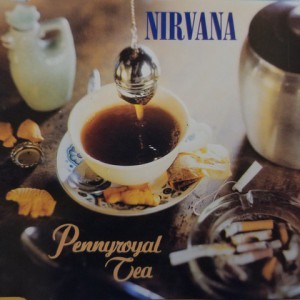
Meanwhile Nirvana’s European In Utero tour, including UK dates that would’ve been the first since the legendary 1992 Reading Festival headline set, could obviously be no more; becoming one of the many unfulfilled realities that fans could now only wonder about.
Another, it would emerge later in the year, being Cobain’s apparent collaborations with REM’s Michael Stipe – a project that Stipe claimed they’d been discussing seriously; though the REM frontman later admitted he’d come up with the project really to give the depressed Cobain something to look forward to and focus on.
One of my most abiding memories from that time was Hole’s appearance at the Reading Festival a couple of months later and what an impression that performance had on me; Courtney appearing in equal measure like some sort of mourning angel and vengeful demon.
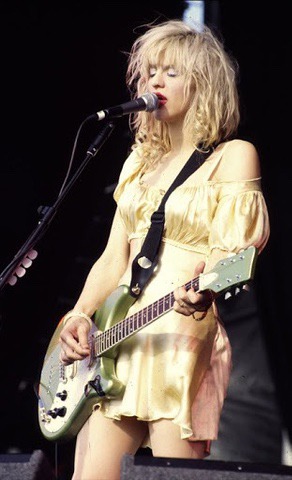
Two years earlier, Kurt and Nirvana had headlined the same festival: a show that was by then already the stuff of legend (and in which Cobain had famously urged the crowd to chant “Courtney, we love you” – it had been his sweet way of trying to convince Courtney that not everyone hated her).
The Live Through This album, released painfully close to her husband’s death, was incredible; it made me a Hole fan (and somewhat a Courtney defender in the future) – and Courtney defending would, in the many years to come, become a time-consuming job.
That album would’ve been a masterwork in any context, but the fact that it was released amid the bleak demise of Cobain’s life and their marriage imparted that album an even greater poignancy and resonance – almost too poignant and too beautiful to even contemplate. “I want you to know you made a really great album…” was (allegedly) the last thing Kurt ever said to Courtney, via telephone.
Conspiracy theories (which I will come to more fully in a few paragraphs’ time) have sprung up about the the themes and nature of Live Through This, the timing of its release in relation to Cobain’s death, claims about Cobain having unofficially written much of the album himself, or claims that Kurt had been having an affair with Hole’s bassist Kristen Pfaff (who herself was found dead of a heroin overdose a month later).
Some of that stuff is troubling and difficult to process: the one thing I’ll say, however, is that the idea that Kurt should have credit for Live Through This is driven by nothing other than sexism and the idea that Courtney and a ‘girl band’ couldn’t have written an album as good as that.
Later in the year, the album release of Nirvana’s classic MTV Unplugged in New York performance provided a suitably poignant and tasteful swan-song and tribute to Cobain and his little punk band from Aberdeen.
What an extraordinary, poised, tender performance; About A Girl sounded incredible, the Meat Puppets’ covers were interesting, The Man Who Sold the World was too resonant to even listen to (“I must’ve died alone, a long, long time ago…” gets me every time I hear it), and the cover of Leadbelly’s Where Did You Sleep Last Night was just too emotion-laden, too raw in it’s moody finality, though it was of course the most beautiful, memorable final note, final howl, to finish on.

There’s a specific shot in the footage, right near the end – where Kurt’s eyes are shut during that final sore-throated blues howl – that always haunted me; when he opens his eyes again, he looks confused as if he’d forgotten where he was, as if he’d already gone into some far-away realm of consciousness with Leadbelly’s moody words.
Nirvana’s unplugged show, aesthetically arranged by Cobain to resemble a funeral with all its delicate flower arrangements and lit candles, somewhat ironically justifies the existence of MTV, without which the show wouldn’t have existed.
The release of the compilation video Live! Tonight! Sold Out!, which Cobain had worked on himself, further highlighted just how great a band and how great a journey Nirvana had been; I’ve never forgotten watching that TV performance of Territorial Pissings on the Johnathon Ross Show – it was the rawest, most primally powerful TV performance of a song imaginable and it blew me away.
To this day, I’ve never come across a TV appearance like it. Watch any of the tame, watered-down, commercial television appearances by bands or artists of any type today and then go watch Nirvana on the Johnathon Ross Show in 1992 and the difference is mind-blowing.
That song and that video made me want to be in a band.
In fact, when my last band happened to be booked to play a gig in London about seven years ago and it happened to be on April 5th, we decided to cover Territorial Pissings as a little tribute to Cobain – all the more because the venue in Kentish Town had once seen Nirvana on its stage too. That one simple song (it’s only three fucking chords) is the most primal, liberating song in the world to play, seriously; it feels amazing, feels so powerful.
That Live! Tonight! Sold Out! video was released four months after Kurt’s passing, the same time as Unplugged; I devoured that video, watching it endlessly, this being in the days long before You Tube.
Referencing Cobain in songs has also become a not-uncommon phenomena over the years; in 1994 specifically, Cobain’s friend Michael Stipe wrote the song Let Me In on REM’s Monster album that year about Kurt. It’s a moving, haunting track. A number of big albums by big acts of the time seemed to be haunted someone by Cobain’s ghost: this was evident too, for example, in Pearl Jam‘s Vitalogy album late that same year and particularly the haunting track Immortality. Or in the Red Hot Chili Peppers’ One Hot Minute album, on which the song Tearjerker was Anthony Kiedis’s tribute to Cobain.
In terms of an artist’s death impacting on other artists and resonating across a music scene, there’s never been anything like it.
Beyond the immediate few years after his death, Cobain’s and Nirvana’s legacy has been an interesting and mixed phenomenon to observe.
So many bands, all over the world, started because of Cobain and Nirvana; some of those bands remained small-town indie bands, others fizzled out, and others had some commercial success on the back of Nirvana. Meanwhile lots of journalists and magazines tried to pretend they’d been Cobain admirers and Nirvana fans all along, when in actual fact they hadn’t been.
And the question of Cobain’s legacy in the twenty years that have elapsed is a mixed bag, ranging from the cool and appropriate to the tacky or downright horrifying (“Kurt Cobain Day” in Aberdeen, and the weeping statue in the Aberdeen Museum).
I also cringe constantly at the trend of Cobain worship (that’s more or less what it is) on the Internet, which is almost a cult of personality and not even to do with the music so much; it seems entirely like something Kurt would’ve hated.
Meanwhile the imminent induction of Nirvana into the Rock n’ Roll Hall of Fame five days from now leaves me with mixed feelings; would Cobain himself be happy about that? Would he be honored or would he consider it one mainstream validation too far?
Though in truth it’s a bit late to worry about that, given the scale and permanence of Nirvana’s popularity; way too late to go back to Subpop, huh?
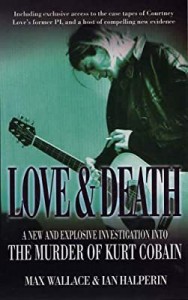
Elsewhere, one difficult and somewhat warped area of Cobain’s legacy that won’t quite go away are the conspiracy theories that endure about his death.
They’re all over the web, the insinuations that Kurt’s apparent suicide was staged, that Courtney was involved in his murder, and so on and so forth. Much of this has always been questionable and unconvincing: however, some of it does warrant serious attention and raise serious questions.
This is probably the area that has caused me the most unrest and difficulty over the years: all the more so because there are some very significant problems with the narrative of Cobain’s death (the testimony of Rosemary Carrol, for example, concerning the possibly doctored suicide note).
The filmmaker Nick Broomfield is somewhat guilty of giving the trend momentum with his 1997 documentary film Kurt and Courtney. Not that he can be entirely criticised for it; given the lurking presence of Tom Grant and Hank Harrisson, the conspiracy narrative was always going to establish itself anyway: and Broomfield’s documentary was actually reasonably balanced and, to be fair, if there are perceived inconsistencies in some of the details of Cobain’s final days, it certainly warranted exposure and questioning.
And there are some inconsistencies and curiosities in some of the details of Cobain’s death – the much-discussed level of heroin in his blood at the time of death, alleged inconsistencies in the handwriting and tone of the suicide note, and most of all the claim made on film by a porn-rock nutjob, Mentors‘ bandleader El Duce, that he had been hired to kill Cobain, combined with the fact that the unfortunate fellow was himself found dead on a train-track days after making the statements.
That’s what’s very frustrating for me about the murder theories – there is merit to them in several key areas (the claims of Eldon Hoke, for example): yet, at the same time, the idea that Cobain might’ve had suicide in his psychology has never been a stretch.
And, at the same time, the likes of Krist Novoselic, Dave Grohl and others close to Cobain have never said anything to suggest they’re inclined towards suspicions about how their friend died.
Conspiracy theories accompany many celebrity deaths, after all. It’s in the nature of some people to be unable or unwilling to accept that some great, wonderful figure isn’t in fact immortal.
Whether or not some of the conspiracy theories have some merit – and parts of them do; I still have trouble with the tone of that suicide note, particularly how so much of it is addressed to ‘the fans’ and the public – it was never a stretch to accept that a man with a history of depression, a man with a serious heroin addiction that he hated himself for, a man who had a history of male suicides in his family, a man who’d (allegedly) already tried to kill himself a month earlier in Rome, a man whose final album was almost titled ‘I Hate Myself and Want To Die’, a man who pretty much acted out his own death with a rifle in a photo-shoot a few months earlier… it was never a stretch to accept that that same man might’ve actually just committed suicide.
Which is why the puzzle is so frustrating: it leaves us nowhere – it’s 50/50 still, even after all this time. It has always been very difficult to find the balanced position between evidence, falsehood, misrepresentation of facts, circumstantial elements, and the ‘truth’.
Again, there are things in this case that really do raise serious alarms: problems with the suicide note and the handwriting discrepancies, for example, and various other things like the claims of ‘El Duce’ or the questionable behaviour of Seattle police. But, yet again, most of the main figures pushing the murder theory over the years are questionable figures themselves: Tom Grant is questionable, while Courtney Love’s father Hank Harisson (a man who has seeming psychopathic tendencies himself and who comes across as an attention-seeker and casher-inner) is no reliable source for anything.
What has also been uncomfortable all along was the level of hatred shown towards Courtney through all this. Not that Courtney Love is a saint – that’s one thing she’ll never be.
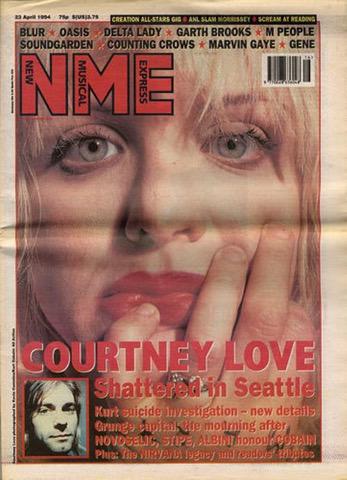
And there are a lot of things about Courtney and the way she’s conducted herself over the years that I’ve always disliked a lot; but there’s a big gulf between that and persistently accusing the woman of murdering her husband. It has to be said, however, that Courtney does herself no favors sometimes and isn’t exactly known for endearing behaviour.
And I’m not trying to be a Courtney defender necessarily: I was a fan of Hole and of hers from those first two albums and that era: I’m not really a fan of anything she’s done since then. But it has also always seemed to be the case that people just don’t like Courtney Love – this has been the case since even before Cobain died (and, again, evidenced by Kurt’s “We love you, Courtney” prompting of the crowd a the Reading Festival in 1992, which he did on account of Courtney’s own perception of being hated by everyone).
This is understandable in a lot of ways: she isn’t necessarily an endearing person, from most accounts. So it isn’t strange that a lot of people would readily demonise her beyond Cobain’s death.
Is she someone who’s dark enough to have consented in or orchestrated her husband’s murder? I have no idea. I lean towards no. But I acknowledge that’s partly because I’ve been a fan of her band and her songs and so maybe I’m less capable of seeing her as the Satanic Witch that so many people seem to think she is.
Maybe I don’t want to see it – so I don’t. I’m self-aware enough to acknowledge that possibility.
In terms of the Cobain Murder Theories overall, I’m permanently stuck somewhere in the middle: not wholly convinced and not entirely sceptical either. The entire thing deeply unsettles me, however – which is why I hit a psychological or emotional wall every time I try to look at that subject.
Meanwhile in the UK, Grunge, Seattle and the US alternative rock scene seemingly became uncool the moment Cobain’s body was found in his Seattle garage, the UK music press deciding the end of Nirvana was the end of the whole business and turning its attention instead to British indie and pop acts.
In the US, however, the alternative rock genre that Nirvana had been so key a part of continued as a massive commercial arena for a while longer, with the likes of Stone Temple Pilots and Soundgarden, among others, having huge albums that same year.
Pearl Jam, however, were noticeably different post-Cobain and seemed to try to move away from the Seattle poster-boy repertoire they’d fairly or unfairly inherited with their first two albums.
And of course, a year later Dave Grohl formed the Foo Fighters, and not much later Krist Novoselic did his Sweet 75 thing (a criminally underrated project that deserves to be more widely heard).
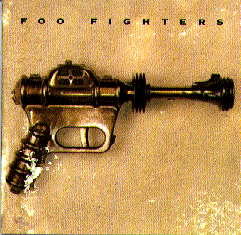
What’s extraordinary now is how many of those bands from that era and that scene have survived, crafting out long careers beyond that scene’s golden flash. And I don’t just mean Grohl and Foo Fighters; Soundgarden have reformed and are more popular than ever, Pearl Jam are still ploughing on, Alice in Chains have reformed even after the sad death of Layne Staley, Mudhoney and the Melvins (the Melvins!) are still going.
It would probably make Kurt Cobain smile; the thought that The Melvins are still going strong some thirty years or so after he was following them around as a kid. No way did Buzz Osbourne imagine back in the 1980’s that his band would be able to fill out international venues in 2014.
And the legacies of that time and those artists has only been enhanced more and more as the years have gone on, far from being the flash-in-the-pan or passing trend that many older commentators dismissed them as at the time.
So many kids today are listening to those bands and those albums that were released years before they were born and bemoaning the lack of quality music in the world today by comparison. So many arrogant commentators and journalists from those years who belittled or mocked the ‘grunge’ scene or the plethora of quality ‘alternative’ bands and artists at the time by citing it as a silly phase that would pass have now been definitively proven wrong.
That whole era of music remains my most cherished and most formative; the sheer amount of brilliant work recorded and released at that time, and not just in the US, being extraordinary. And the bands, artists and albums that made their impression on me at that time are still the works I always go back to even now, the music I most value; but none more so than Cobain and Nirvana.
Though of course I’ve liked all kinds of music and all kinds of bands in the two decades since then, nothing can ever have that level of guttural, immediate impact ever again.
People older than me might talk about the Sex Pistols that way, or what Hendrix means to them or Morrison and The Doors; for me and for lots of others in my approximate age-group or a little older, it was all about Cobain and Nirvana.
About the first time you heard Smells Like Teen Spirit, about the first time that Lithium chorus hit you. About seeing the Heart Shaped Box video and its spellbinding imagery. About devouring the gloriously imperfect ‘In Utero’ album, songs, artwork, lyrics and all and trying to make sense of it.
About learning Territorial Pissings or Aneurysm on the guitar and realising that the easiest, simplest song in the world to play could also feel like the most powerful sonic weaponry imaginable in your hands.
And about that day on April 5th 1994, twenty years to this day, when Kurt Cobain in trying to end his story in fact ensured his immortality.
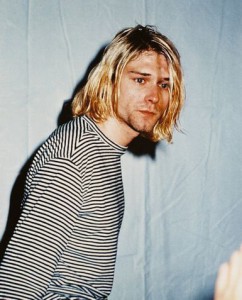
_____________________________________
“I just wish I knew whether he won or lost” – Kim Thayil from Soundgarden, as quoted in Rolling Stone, June 1994
____________________________________


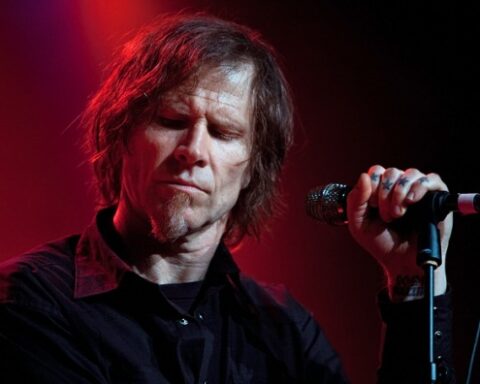


(wait, a “Courtney defender”? oh no! she totally killed him!) ;-)….
Oh, come on, dude! You’re being sarcastic, right? You know what – I don’t defend Courtney as a celebrity; I think she’s tacky as a celebrity and unlikeable. But I still really think she made some fantastic music. I guess we might have to agree to disagree on that one; I know Courtney is a divisive figure.
she DID make some pretty good music, especially the songs she ripped off from Kurt! 😉 (no, I don’t know if she actually had something to do with his death or not, but I definitely think she’s enough of a sociopath to have been capable… Didn’t u say you saw her playing at the Reading festival only TWO months after he was dead?? Think about that…. Who would do that? She was always all about herself, her own career. She’s cray-cray for real, I know that much….)
Yeah, but a crazy human can still make a good musician or frontwoman or whatever. But I accept your position.
Yeah… (but ya know, I was listening to old Pixies, Breeders stuff too, and especially the early Breeders stuff, and I was like Courtney SO “borrowed” from their sound… She just had the extra anger to inject into the mix. I think the Breeders toured with Nirvana, or vice versa, somewhere in the early days, so I’m pretty sure Love would’ve heard them in person before they maybe even recorded anything as their Pixies side project. I think she ripped off all kinds of people, like Billy Corgan, etc…)
Speaking of Corgan, I was just recently listening to the new Smashing Pumpkins stuff. I can recommend it – some of it is really good.
Yeah? I listened to the first half or so after someone threw it up on Youtube, but didn’t get all the way through. Got some great charging riffs in there, and Chamberlain is like, some kind of drum cyborg… sucks that I heard he’s finally done with Pumpkins now. (btw, did you see Corgan talking to Alex Jones? pretty interesting…)
NO! I need to find that. What was Corgan doing with Alex Jones specifically? I think I heard Vedder spoke to Alex one time too, but I’ve never seen the clip.
it’s all over youtube. I guess AJ had him as a guest on Inforwars, (actually maybe a couple of times now) I only found out about it not too long ago. I can’t stomach Alex Jones too much, to be honest, (he’s just obnoxious) even though of course I agree with a lot of the general information they put out on things like 911 Truth or whatever…
I like Alex – i know a lot of people don’t anymore. I find him both informative and entertaining. Maybe I’ll get bored of all the shouting eventually, I don’t know.
Yeah, I certainly don’t think he’s a “government shill”, or anything like that. It’s more just that he kind of took on that whole loud-talk-radio-host persona. A podcaster I love put it this way: “I think Alex Jones just bought into the legend that is ‘Alex Jones’…” 🙂
Reblogged this on theburningbloggerofbedlam.
I never thought he killed himself – I watched a very interesting film I believe on Netflix.
That was pointing a somewhat wobbly finger at his wife – could very well have been.
He certainly had a very sad life.
I know there’s a case to be made for it; but I’ve never really gone with the murder conspiracy. I’ve always accepted the official version of events, as it seems to make sense in the context of his life.